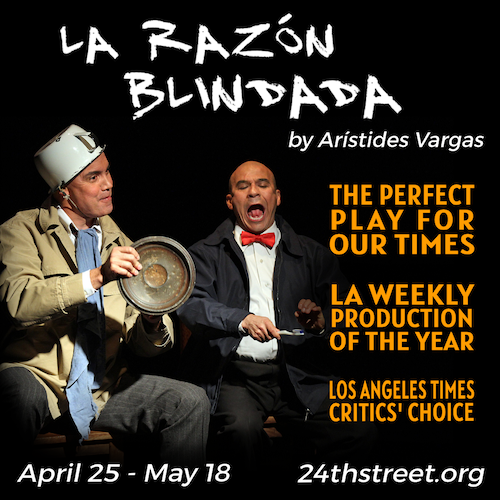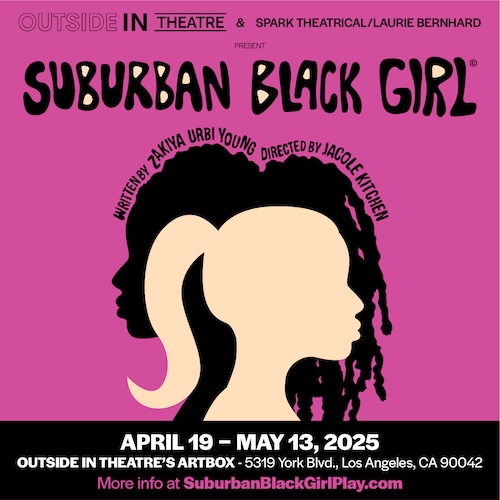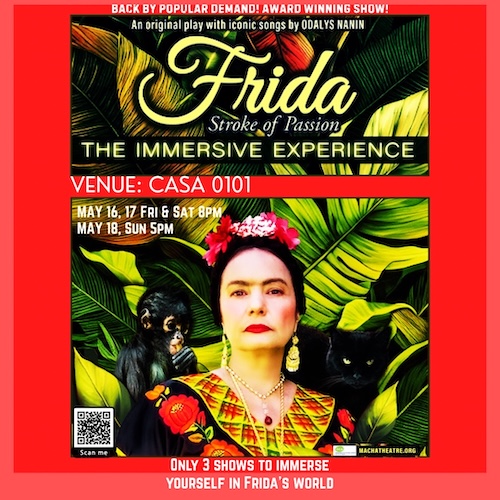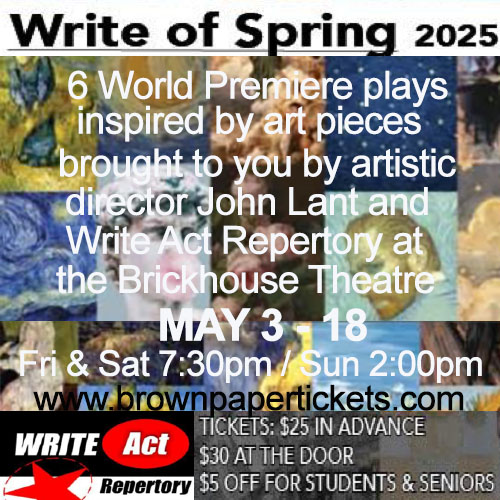The Authenticity of Being Brat
Our National Drama from a Theater Perspective
by Steven Leigh Morris
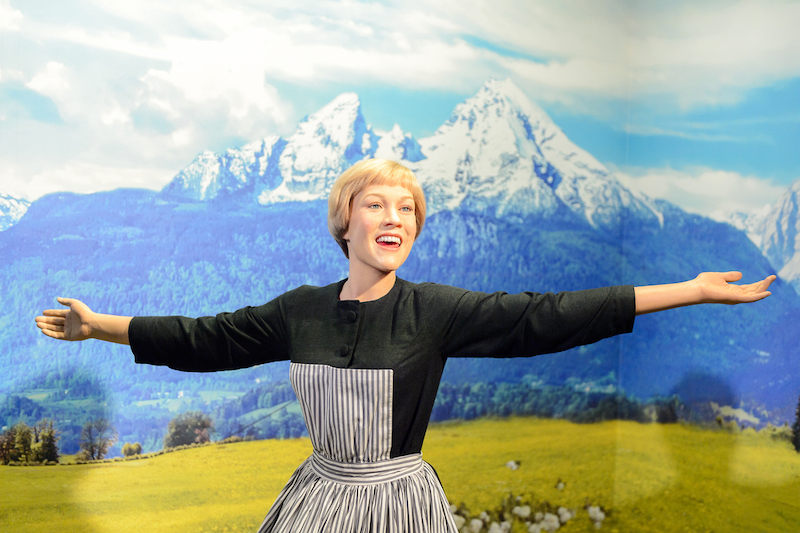
Julie Andrews as Maria von Trapp in “The Sound of Music,” leading the Trapp Family Singers across the Alps, out of Nazi-occupied Austria and into freedom
Let me first say I have nothing against the governor of Pennsylvania.
Not being invested whatsoever in Pennsylvania’s politics, my first, extended look at Josh Shapiro was on my computer feed from Philadelphia, at the first rally introducing the new presidential ticket of Kamala Harris and Tim Walz. Chatterers on mainstream media as well competing feeds such as The Meidas Touch Network were all predicting (wrongly, as is so often the case) that Shapiro was most likely to nab the Veep slot on the Democratic ticket because the Dems needed Pennsylvania’s electoral votes, despite scant evidence that a Veep candidate ever delivers their home state. Harris evidently followed a different kind of evidence, and chose the governor of Minnesota, Tim Walz, instead.
The Dems, in a rare and inspiring moment of common sense, swiftly coalesced around the new Harris/Walz ticket, leaving Shapiro to introduce the pair to a jubilant Philadelphia crowd of some 12,000 people.
And there stood Shapiro at the microphone, a kind of human tower, bellowing an oratory on core principles of American democracy and on the virtues of the two people he was introducing.
Despite subsequent commentary by the aforementioned media chatterers about what an inspiring speech this was, all I could think of, from my perch as a drama critic — no, it’s not a perch, it’s more like a sinkhole — was, this guy is faking, or what used to be called appropriating. This performance simply doesn’t ring true. It’s not authentic. Here’s a perfectly amiable and evidently savvy White Jewish guy doing his impersonation of Martin Luther King: the same cadences, the same, solemn pauses following a crescendo. But where, in such pauses, King showed a pained, stoic conviction, Shapiro looked slightly smug and self-satisfied, as though he was very aware of the moment he was rising to, and he was going to let everyone know how aware he was. It was a performance. It was theater. And not entirely persuasive, in my view.
Alas, we live in an age when the people who govern us are selected as much on their capabilities as performers as on their qualifications and accomplishments.
And then Tim Walz spoke, and I thought to myself, “She made exactly the right choice.” Though the aging, silver-haired and balding man is witty, animated, ebullient, and funny in a down-home way, he also seems comfortable in his own skin. She just put Mark Twain on the ticket. That’s pretty smart.
And then Kamala took the stage, with her blend of emotive compassion, earnestness, and severity, juxtaposed against a grin that lights up the sky. And of course, that laugh: Laugh, and the world laughs with you. Talk about rising to meet the moment.
My wife had been skeptical of Harris’s chances of winning an election, and she refuses to watch political speeches. The fakery upsets her, “fakery” being a euphemism for theater. “No,” I tried to convince her, “She’s really magnificent, in her performance, her delivery is perfect.”
I don’t know if Kamala Harris has created this movement that’s transformed our political environs, or whether the movement is creating (re-creating) her. Sometimes a show arrives just at the right time, and it feels like magic, such as Hamilton in 2016. It unearths a yearning in the collective subconscious, a mythical belief in the promise of America.
It feels as though we’ve been living through a decade of Little Shop of Horrors, Sweeney Todd and a production of Titus Andronicus in which the actors refuse to leave the stage. The history of the United States is a history that has embraced violence, slavery, bigotry, and government oppression almost as fervently as it has democracy’s norms of personal liberty, social responsibility and equal opportunity. But somehow, as though by the wispiest sliver of fate, the democracy part has always squeaked through. It’s not as though there wasn’t a groundswell of Americans supporting Nazi Germany and America isolating itself from getting involved fighting European fascism in the 1930s.
I remember around 1991, when I first visited Russia at a time when then Soviet President Mikhail Gorbachev was gaining international support for his arguments for democracy there. The artistic director of my host theater in Moscow laughed, saying (prophetically) that democracy simply isn’t in Russia’s DNA. After a decade of cynicism, I now wonder if democracy and the optimism it engenders, however fragile, however frayed, isindeed part of America’s DNA. Perhaps what we’re now experiencing is a national impulse to close that unending production of Titus Andronicus, and replace it with The Sound of Music, where Kamala Harris, as a biracial Julie Andrews, leads the Trapp Family Singers over the Alps from Nazi-occupied Austria to a more conciliatory refuge.
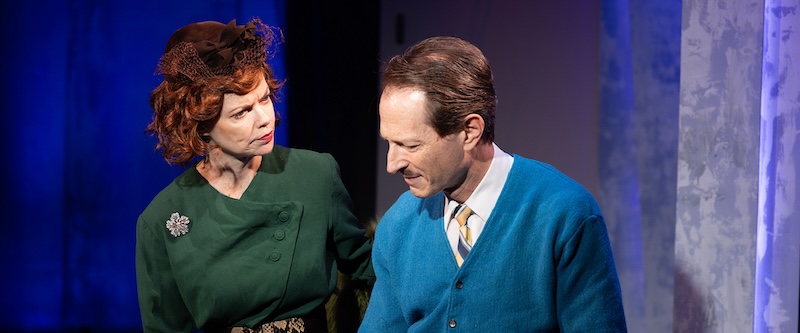
Ann Noble as Leni Riefenstahl (among other roles) and Leo Marks as Walt Disney (among other roles) in Tom Jacobson’s “Crevasse” at the Victory Theatre Center (Photo by Matt Kamimura)
This also brings to mind playwright Tom Jacobson’s absorbing Crevasse at the tiny Victory Theatre Center in Burbank, depicting the seminal American figure of Walt Disney (played by Leo Marks) as a man-child with an almost genetic link to the American subconscious, with stories and cartoons that flamed across the world. Jacobson’s Disney is a man who had no patience for communism or communists; nor for that matter, fascism. Jacobson depicts him as a centrist who “borrowed” Nazi propogandist Leni Riefenstahl’s (Anne Noble) cinematic devices to attack fascism in general, and Hitler in particular.
Despite the dark underpinnings in their musicals, Rodgers and Hammerstein trafficked in American optimism (with a sentimental cushion that was of that time), contributing to that optimism being one of our leading national exports. And the world loved us for it, if theater and movie ticket sales are any indication.
Only one month ago, that all felt so old. Suddenly, in the blink of an eye, it’s news again. I just watched clips from The Sound of Music, and there’s the teenage girl, Liesl, singing “I’m just sixteen going on seventeen,” while her boyfriend, Rolf, counters that he’s seventeen going on eighteen, how much more he knows, and how he’ll take care of her. She swoons in devotion, and I’m thinking, well, there’s a gut-punch to the belly of feminism. By the end of the show, however, Rolf has joined the Nazi party and Liesl sticks with her clan to flee him and his type. Talk about leaving an abusive relationship. These shows weren’t quite as simple-minded as I’d imagined, as a younger man.
THE YOUNG AND THE RESTLESS
By the time they got to Phoenix, I had been watching every Harris/Walz rally and stump speech. It was like watching a touring production of a Broadway show. Different city, same script. Same delivery, perfectly timed. Same gestures. Hands clutching hearts. “It’s so good to be back in . . . [what city is this?]” The crowd knew the lines, and sometimes shouted them out, before they were spoken by the principles. Theater.
Is this authentic? Have we been gamed once again?
Harris has been attacked (big surprise!) by the “other side” for staying on script, for not speaking authentically. (Five days into a campaign she’s supposed to articulate a detailed platform?) I’m not sure I understand what authenticity is anymore. Authenticity is in the eye of the beholder. It’s something of a mirage, on stage as in life.
Perhaps Plato was right after all — that there may be “truth” but we’re incapable of seeing it. What we see are shadows on the cave wall. And those shadows come in a wide array of shapes and sizes. It’s all so confusing.
Among a handful of eternal questions that’s particularly salient in our era of AI deepfakes and disinformation: How do we know what we think we know is true?
This year, a Gen Z teen writer in the Stage Raw Unusual Suspects Youth Journalism Fellowship said, in a group meeting, something she didn’t personally agree with — how most of her generation found theater to be “stupid and weird.” She went on to describe the antipathy (of her generation) towards actors on stage who stop, in the middle of an emotional moment, to start singing about those very emotions. Well, there goes all of musical theater and its first cousin, opera, straight down the drain.
This youthful predisposition against theater and its artifices, if true, makes almost no sense to me, given the blatantly contrived, smoke-filled, gymnastic, theatrical artifice in concerts by Taylor Swift and Charli XCX that draw Gen-Z audiences in bulk. When the singers stop their monologues to belt out a song, that doesn’t seem to be a problem at all, in the style or authenticity departments.
I’d argue that it’s a generational divide, with a youthful antipathy towards live theater; except that live theater, filled with special effects and stylistic abstractions, is a youth commodity in other countries. Just not in ours.
I’m drawn to the theory that young generations on our turf simply have little idea of what local theater is available to them, what it looks like, and what it’s capable of. This isn’t entirely their fault. Compared to other places, even with their cuts to public education, our theater has done a crappy job of marketing itself to the young. And that’s not entirely our theaters’ fault, when producing a play has become exponentially expensive and resources have become so anemic.
Here’s what I know: The teenagers in our writing Fellowship (theater students) are fully aware that they’re being gamed, seduced, manipulated by social media algorithms, and by pop culture. They’re not stupid. They know they’re being fed misinformation and disinformation. They know their addiction is a bad thing for their mental health. They, too, feel lonely, depressed, and suicidal. They, too, are searching for something authentic in a world of fakery.
As Leonard Cohen’s lyric in “Suzanne” so poignantly offers:
“And she shows you where to look amid the garbage and the flowers,
“There are heroes in the seaweed, there are children in the morning,
“They are leaning out for love, and they will lean that way forever,
“While Suzanne holds the mirror.”
Our theater holds the mirror. It shows us where to look amid the garbage and the flowers.
I don’t know what “authentic” means any more. I do know that these kids know it when they feel it, much like the rest of us.
America’s youth quickly discovered the Harris/Walz show and they’re energized by it, by its optimism, by its promise that they, too, have a place in this world. This is demonstrably supported by the numbers of young campaign workers joining the ranks, and in the polls. Then again, that show had the budget to reach them. A month ago, they were disengaged, now they’re not.
Where does that leave the shows with scant resources, who may also have something of value to offer?
This speaks of the need to pool resources, to campaign, with youth outreach programs such as those operated by Center Theatre Group, Latino Theatre Company and TeenTix L.A.
Our theater needs to do what theater has done through the millennia: Reach out. Invite people. Provide a kind of home. Nurture relationships. Offer opportunities. Offer dignity. Offer a sense of belonging. Offer hope. In such environs, I’ve seen kids flourish, like everyone else.
Our theater holds the mirror.




